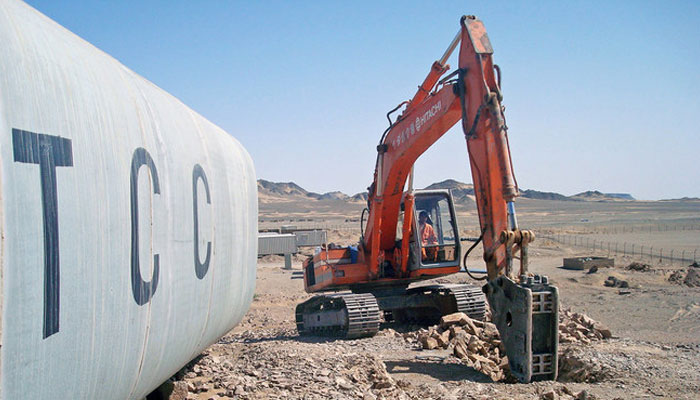Capital suggestion: Reko Diq’s rescue
How could a government – any government in the world – turn a hundred billion-dollar asset into an eleven billion-dollar liability? In 1993, BHP Billiton, an Australian mining company, engaged in the ‘Chagai Hills Exploration Joint Venture Agreement (CHEJVA)’ with the government of Balochistan to explore and extract copper and gold from the Reko Diq Mine.
The then prime minister Moeen Qureshi, adopting ‘international best practices’, negotiated what was considered the best deal for Pakistan. By 1997, BHP had identified substantial reserves, totalling 5.9 billion tons of ore, 11 million tons of copper, 660 tons of gold, and uranium, with an estimated mine life of 56 years.
In 2000, Australia’s Mincor Resources bought out BHP shares. In 2006, Reko Diq became jointly owned by Antofagasta with 37.5 per cent, Canada’s Barrick Gold 37.5 per cent, and the government of Balochistan 25 per cent. Tethyan Copper Company Pty Limited (TCC), a subsidiary of Mincor Resources, assumed all rights and obligations of BHP under CHEJVA.
In 2011, TCC, after having invested $220 million, applied for a mining lease. TCC was refused a mining lease (TCC told me that they couldn’t ‘pay’ for the ‘same favour’ twice). In 2013, the Supreme Court of Pakistan rejected TCC’s application.
On July 12, 2019, the International Centre for Settlement of Investment Disputes (ICSID), a branch of the World Bank, granted damages totalling $5.84 billion to TCC. Dismissing Pakistan’s allegations of corruption against TCC, ICSID affirmed the validity of the 1993 agreements as binding agreements between Pakistan and TCC. The tribunal found Pakistan’s justifications for denying the license to TCC unconvincing.
At a certain juncture, the GHQ intervened, assumed control of the project, and initiated measures toward a comprehensive resolution. I can affirm that at a certain point in time, Major General Azhar Waqas was tirelessly working late into the night, earnestly striving to restore order and set things back on track.
In March 2022, an out-of-court settlement was reached with Barrick Gold under which the fine imposed by ICSID became ineffective. In December 2022, Barrick Gold announced plans to invest $10 billion for the revival and development of the Reko Diq project with production starting in 2028.
This case serves as a vivid example of how personal interests can convert a hundred billion dollar national asset into an eleven billion dollar liability. Key decisions were swayed by individual greed, resulting in a distorted prioritization of personal enrichment at the expense of the Reko Diq mine’s long-term potential. The Reko Diq case has eroded public trust in governmental decision-making processes.
Teaching this case in universities can highlight the importance of maintaining public trust through transparent governance and ethical conduct, emphasizing the severe consequences when these principles are compromised.
The Reko Diq case can serve as a global lesson in business ethics, showcasing the pitfalls of allowing individual greed to dictate major business decisions. Integrating this case into university curricula worldwide can help future leaders understand the broader implications of unethical practices on a national scale. By examining the consequences of prioritizing personal wealth over national welfare, students can gain valuable insights into the importance of ethical decision-making in business and governance.
The writer is a columnist based in Islamabad. He tweets/posts @saleemfarrukh and can be reached at: farrukh15@hotmail.com
-
 Sarah Ferguson, Shamed Andrew Spotted In ‘family Costume Drama’
Sarah Ferguson, Shamed Andrew Spotted In ‘family Costume Drama’ -
 Kylie Kelce Reveals Why She Barely Planned Her Wedding Day?
Kylie Kelce Reveals Why She Barely Planned Her Wedding Day? -
 Why Shamed Andrew Called His Victims ‘Mrs Windsor’
Why Shamed Andrew Called His Victims ‘Mrs Windsor’ -
 Kate Hudson Explains Why Acting Isn't Discussed At Home
Kate Hudson Explains Why Acting Isn't Discussed At Home -
 Prince William, Kate Middleton Epstein Statement Was AI Generated, Says Expert
Prince William, Kate Middleton Epstein Statement Was AI Generated, Says Expert -
 Sarah Ferguson On Her Way To Hurt 'only Two People Who Care About Her'
Sarah Ferguson On Her Way To Hurt 'only Two People Who Care About Her' -
 World’s Top PC Maker Sounds Alarm Over Memory Chip Shortage
World’s Top PC Maker Sounds Alarm Over Memory Chip Shortage -
 King Charles Is ‘clearly Worried’ Andrew Has Tarnished Royal Image
King Charles Is ‘clearly Worried’ Andrew Has Tarnished Royal Image -
 Royal Family Loses 'loyal' Worker After King Charles Disliked His Work?
Royal Family Loses 'loyal' Worker After King Charles Disliked His Work? -
 James Van Der Beek's Quiet Sacrifice Before Death Comes To Light
James Van Der Beek's Quiet Sacrifice Before Death Comes To Light -
 Suspect Kills Six Across Florida Before Taking His Own Life
Suspect Kills Six Across Florida Before Taking His Own Life -
 AI Helps Researchers Identify 2,000-year-old Roman Board Game Stone
AI Helps Researchers Identify 2,000-year-old Roman Board Game Stone -
 Inside Kate Middleton, Prince William’s Nightmare Facing Andrew Mountbatten-Windsor
Inside Kate Middleton, Prince William’s Nightmare Facing Andrew Mountbatten-Windsor -
 Margaret Qualley Shares Heartfelt Confession About Husband Jack Antonoff: 'My Person'
Margaret Qualley Shares Heartfelt Confession About Husband Jack Antonoff: 'My Person' -
 Savannah Guthrie Shares Sweet Childhood Video With Missing Mom Nancy: Watch
Savannah Guthrie Shares Sweet Childhood Video With Missing Mom Nancy: Watch -
 Over $1.5 Million Raised To Support Van Der Beek's Family
Over $1.5 Million Raised To Support Van Der Beek's Family




